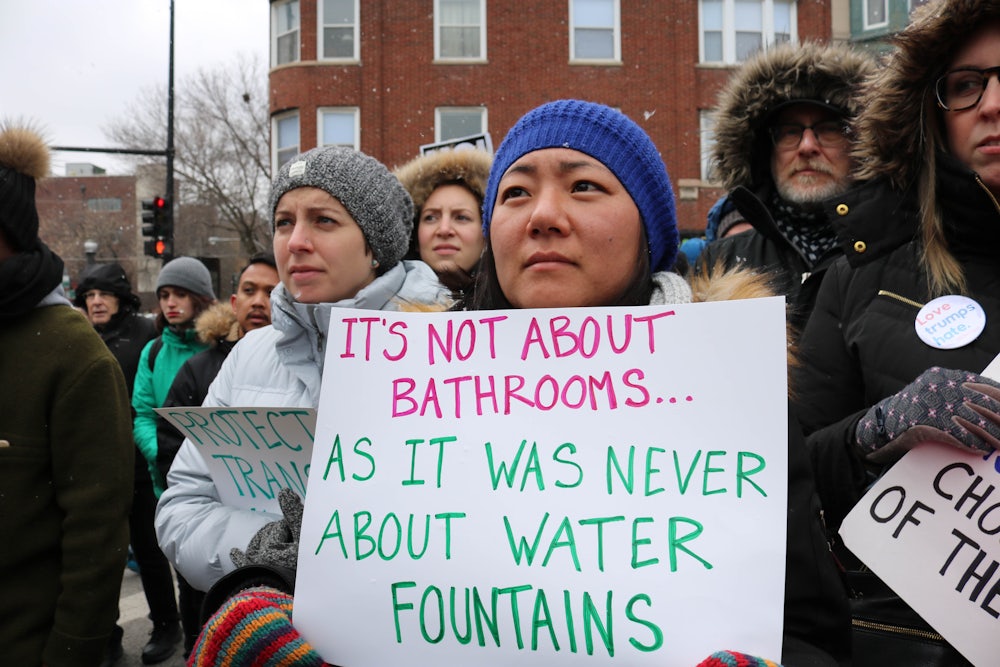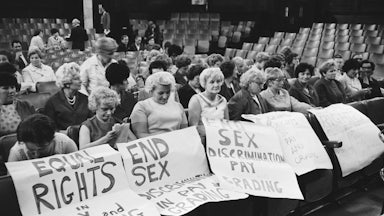Indiana Stonewall Democrats have responded in a novel way to Republicans’ sponsorship of a sports ban targeting trans students, alongside other anti-trans bills: with a Freedom of Information request, aiming to expose and highlight the sponsors’ relationship with national anti-LGBTQ groups. These relationships are no secret. But the Stonewall Democrats are hoping, in particular, to get documents on Alliance Defending Freedom, a group that has spent the past decade drafting, advising on, and testifying in favor of anti-trans legislation across the United States. “[ADF] wants to do all they can to make transgender kids afraid of themselves, and force them to believe that they’re broken,” said Indiana state Senator J.D. Ford last week. “They are being pitted against their neighbors and their communities solely for political purposes.”
The group, a “legal army” (according to its founder) which the Arizona Republic has described as “fighting culture wars from a Scottsdale office park,” holds assets of more than $40 million, according to its most recent tax filings. “Within the world of legal organizations that are influential on the Christian right,” writes Sarah Posner, who has reported on ADF for more than a decade, “ADF’s reach and relentlessness is unparalleled.”
ADF’s nationwide network of lawyers, working from county school boards to the Supreme Court, have helped state legislatures and the courts in attempts to roll back LGBTQ rights under religious “viewpoint discrimination” claims, and crafted state bans on abortion explicitly meant to overturn Roe v. Wade. Their fight to enshrine anti-trans discrimination into law is just as audacious: So far in 2022, more than a dozen states have introduced anti-trans bills, which if passed would work step by step to exclude trans people from the public sphere. ADF calls all these “generational wins.”
ADF and allied Christian right groups have recast their crusade on behalf of patriarchal gender and sexuality norms in benign-sounding rhetoric, leadership, and storytelling. “We are encouraged that so many lawmakers have taken it upon themselves to listen to what parents and children are saying, and that they have introduced legislation to protect children’s minds and bodies,” Emilie Kao, then the director of the Richard and Helen DeVos Center for Religion and Civil Society at the Heritage Foundation, told 60 Minutes last June. Sounds bland, though it should raise red flags if you have ever heard of, say, Anita Bryant and her own “Protect America’s Children” campaign against anti-gay discrimination ordinances, from 1977. ADF’s playbook is a glossy republication of an old manual.
What groups like Heritage and ADF want, according to Kao, is “to protect children’s minds, bodies, and relationships with their family from the distraction of gender ideology.” The goal of this aggressive wave of anti-trans legislation, they claim, is merely “to make sure that the voices of parents and children are reflected in the laws.” ADF does not use the word “transgender” when pushing laws that are designed to directly endanger trans people. But embedded in this deceptively neutral language of “gender ideology” is a cataclysmic victory in its reactionary war: By reframing trans people’s right to exist as ideology, ADF and others have succeeded in turning the lives of trans people into a debate. When you read that trans kids are “new” (and they aren’t) or that transition-related care for children and teens is “controversial” even in the medical establishment (it’s not), that’s the Christian right groups’ quiet triumph.
“We are continuing to pretend our enemy is an anonymous, amorphous blob of people who inexplicably hate trans people, when it’s been the same people opposing queer justice (and feminism, and abortion, and voting rights, and comprehensive health care) for decades,” Heron Greenesmith, senior research analyst with Political Research Associates, wrote me this week. “Literally the same people: Alan Sears [ADF founder], Tony Perkins [Family Research Council president], James Dobson [Focus on the Family founder], Michael Farris [ADF CEO].”
But while identifying the source of anti-trans legislation is important, particularly in media coverage, the reporting that’s been done on ADF so far has not halted the wave of bills. As Greenesmith told me, “We need to do more than just expose the actors.”
“Ultimately, in 2022, we are seeing more strategies rolled out to push trans people out of public life and eradicate transness,” Chase Strangio, staff attorney at the American Civil Liberties Union, told me this week. Liberals seem to be abandoning trans people to fight these battles on their own, and, as Strangio said, reactionary groups see this: “They are using the lack of resistance to expand their objectives, with their primary objective being to stop anyone from being trans.”
From the beginning, the goal has been to isolate trans rights from the support of mainstream LGBTQ rights groups and other likely allies. One of the early tests of this strategy was the bathroom ban introduced in Arizona in 2013, which sought to define using a bathroom not in alignment with the gender listed on one’s birth certificate as “disorderly conduct,” potentially punishable by six months in jail. The bill’s sponsor, Republican state Representative John Kavanagh, said it was a response to an LGBTQ anti-discrimination ordinance passed that year in Phoenix, which was meant to prohibit discrimination based on sexual orientation and gender identity. The right-wing Center for Arizona Policy insisted, falsely, that the anti-discrimination ordinance “forced businesses to allow a man dressed as a woman into their women’s restroom,” and called the anti-discrimination ordinance itself, rather than Kavanagh’s proposed ban, “the bathroom bill.” The goal was to make trans-inclusive anti-discrimination bills seem toxic or risky to other legislators. The bathroom bill failed, but the strategy would soon be replicated.
The following year, Alliance Defending Freedom expanded the manufactured bathroom panic and launched a nationwide effort to change public school district policies to exclude trans students, spreading the misinformation that trans kids made bathrooms “unsafe.” It provided similar model legislation to states, the Student Physical Privacy Act, which included a bounty of $2,500 per trans student reported for using the “wrong” bathroom, paid to students who reported them (a vigilante tactic that would return in the 2021 Texas abortion ban, Senate Bill 8). A Media Matters analysis identified almost identical language in bills introduced in 2015 in Nevada, Kentucky, Minnesota, and Texas. None of these bills became law, but the moral panic was spreading. And ADF did succeed in getting its model policy adopted by at least one school district, in Gloucester County, Virginia, which local news called a “children’s privacy” policy. That was rescinded in 2021, after a Supreme Court challenge brought by a student, Gavin Grimm, who, by then, was no longer a student there.
The Christian right’s first real win with this strategy came in November 2015, in Houston, Texas. In a move reminiscent of the failed Arizona bill, anti-trans groups used a bathroom safety misinformation campaign to repeal the recently passed Houston Equal Rights Ordinance, or HERO. The Family Research Council and Alliance Defending Freedom provided support to the Texas activists; the Family Policy Alliance praised them, proclaiming, “While the radical agenda of the homosexual and transgender lobby has rocked the nation in recent years, the ‘pushback’ is gaining real steam,” and, “It started in Houston.” The national Christian right helped replicate the Texas success with perhaps the most nationally publicized anti-LGBTQ bill sold as a “bathroom bill,” North Carolina’s House Bill 2, drawing—in a common move now—on ADF model legislation.
At the same time, the Christian right’s larger anti-trans framework was formalizing. In June 2015, the Family Research Council published its strategy for “responding to the transgender movement.” It claimed, in a typical kind of gaslighting, that “transgender activists blame their problems on ‘transphobia.’” It then cited “feminist author Janice Raymond”—specifically that “she refers to ‘transsexualism’ as ‘the falsification of reality.’” Anti-trans discrimination and trans people themselves thus reduced to fiction, FRC then pushed for policies that would both define trans people out of the law and make living as a trans person nearer to impossible. Its specific policy objectives were framed as controversies to start: “Should the government legally recognize sex changes?” “Should the government force others to recognize sex changes?” “Should the government force others to pay for medical gender reassignment procedures?” To turn that into action, the Christian right would continue to draw on—and eventually court—anti-trans feminists.
The Trump years, which reinvigorated a mainstream women’s movement in the United States, also saw the entrenchment of anti-trans feminism. “The real war on women,” the head of the Christian right group Family Policy Institute of Washington State wrote in 2016, was the “transgender phenomenon,” which was “an attempt to force the world to accept that being a woman is nothing more than a feeling.” As Cole Parke with Political Research Associates noted at the time, in a report on this alliance, “Under the guise of feminism, they’re ready to go to battle, their patriarchal battle cry being, ‘Protect our girls!’” The next year, at the Values Voter Summit, the anti-trans advocates’ tactics became even more clear: They now saw anti-trans feminists as natural allies.
Meg Kilgannon, then the executive director of Concerned Parents and Educators of Fairfax County, appeared at the summit in 2017 and issued three “nonnegotiable” directives, as documented by Right Wing Watch. One: “Focus on gender identity to divide and conquer,” because “for all of its recent success, the LGBT alliance is actually fragile.” Two: no personal attacks. “If you attack trans people, you become the proof they rely on for demanding protection.” (That is: Don’t prove that anti-trans discrimination is real.) And three: no religious arguments. Use feminism instead, or at least, the feminism that the Christian right is willing to work with—the kind that views gender identity as the “ultimate misogyny” and “the erasure of women,” she said, two key anti-trans feminist talking points.
This strategy of weaponizing feminism became explicit when an anti-trans feminist group called the Women’s Liberation Front, or WoLF, and the Family Policy Alliance formalized an alliance in 2017. The two groups submitted a joint amicus brief to the Supreme Court opposing Gavin Grimm’s legal challenge to the ADF-drafted anti-trans bathroom policy in Virginia. Echoing Kilgannon, WoLF co-chair Kara Dansky defended their alliance with the Christian right, saying in a Family Policy Alliance video that “on certain issues, such as gender identity, pornography, and prostitution, WoLF finds that the left has pretty much sold out women.”
Such anti-trans feminist groups, noted Katelyn Burns at Vox in a 2019 explainer on anti-trans feminists, “now prefer to call themselves ‘gender critical,’ a euphemism akin to white supremacists calling themselves ‘race realists.’” These groups have now charted a path for others to take anti-trans positions while claiming the mantle of women’s and gay rights. They will tell you they don’t hate trans people.
Hate itself is a kind of cover. “At PRA, we’re moving away from hate framework, because it doesn’t describe what these organizations are doing, and it doesn’t help describe their power,” Heron Greenesmith told me. “And it allows people to excuse themselves, ‘I don’t hate trans people,’ when what we are talking about is, ‘Is this organization perpetuating misinformation about trans people that perpetuates state and interpersonal violence against trans people?’”
In folding feminism (or the appearance thereof) into Christian right groups’ anti-trans agenda, these groups’ combined efforts helped put a question mark on trans people’s existence. Their alliance helped inject Christian right policy objectives into public debates between liberals, as in the infamous 2018 Atlantic cover story, “When a Child Says She’s Trans.” A narrative had taken hold across the political spectrum: Trans children were now cast as not-really-trans victims of “gender ideology.” (“Gender ideology” here meaning, misleadingly, the affirming adult trans people and supportive medical providers, educators, and families in kids’ lives.) Christian right groups would continue to broaden the fight, expanding their alternate reality in which trans people were a threat to children. An October 2019 “Summit on Protecting Children From Sexualization,” with panelists from the main three national groups pushing anti-trans bills—ADF, Heritage, and Family Policy Alliance—positioned gender-affirming care as a form of “sexualization.”
In the words of the summit materials, “Controversial medical treatments to treat gender dysphoria” endanger children, and “it’s critical to preserve parental rights, freedom of conscience, and free speech in order to protect children from unwanted sexualization.” (Affirming trans children, therapeutically and medically, in fact, is not controversial.) They cemented this rhetoric and policy agenda in 2021 with a “Promise to America’s Children.” “Every child deserves safety and privacy in sex-specific spaces,” the Promise states. “Every child deserves the opportunity to be affirmed and in their biological sex.” The language may seem vague. But knowing the history, the agenda should be clear.
A record 147 anti-trans bills were introduced in various states in 2021. Thirteen would be adopted. In 2022, the bills are again proliferating, on pace to exceed last year. This includes a new bathroom bill in Arizona, brought by the same Republican legislator behind the original 2013 ban. (It had a hearing this week.) “These groups saw the success they had in 2021 and are trying to repeat and escalate their attacks in the context of what they perceive to be a more hospitable climate—both legislatively and judicially,” Chase Strangio of the ACLU told me. “That’s why we are seeing bathroom bans return after years of almost no movement on a bathroom ban. And they will not stop until we have a significant and coordinated strategy to stop their momentum.”
The groups and leaders who promote this anti-trans agenda are bound not just by their desire to legislate trans people out of existence but by extensive overlapping employment and interpersonal ties, consolidating their influence. Meg Kilgannon, who issued her three-point anti-trans directive at Value Voters, works at Family Research Council, after serving as the director of the Department of Education’s Center for Faith and Opportunity Initiatives under Trump. Trump’s education secretary, Betsy DeVos, can boast that her father, Edgar Prince, helped launch the Family Research Council, and her family’s foundations reportedly move millions in support of their allies, including ADF. And Michael Farris, a homeschooling advocate before he became the head of ADF, secretly drafted a lawsuit meant to overturn the 2020 election in favor of Trump, which was shopped around to willing attorneys general by allies like the former chief justice of the North Carolina Supreme Court. When The New York Times reported this, Farris claimed these “Stop the Steal” efforts had nothing to do with his work at ADF.
It has not been easy, even for trans rights advocates, to puncture the political fantasy world these anti-trans groups have created and tried to legislate into existence. Their vision of society has been powered by coordinated misinformation campaigns and the constant threat of litigation. Allies continue to struggle to challenge the anti-trans bills for what they are: attempts to empower the state to eliminate trans people or anyone who does not conform to its normative standards of womanhood, standards that have long shaped the right’s crusades against reproductive and gender justice. It is the same fight, with the same players, but more importantly, the same vision of “returning” to a Christian patriarchal state. That is the fantasy they seek to see realized, and under cover of law.










